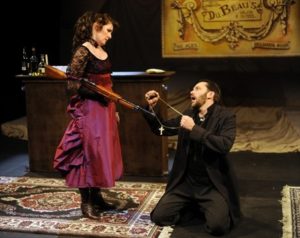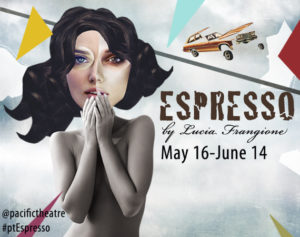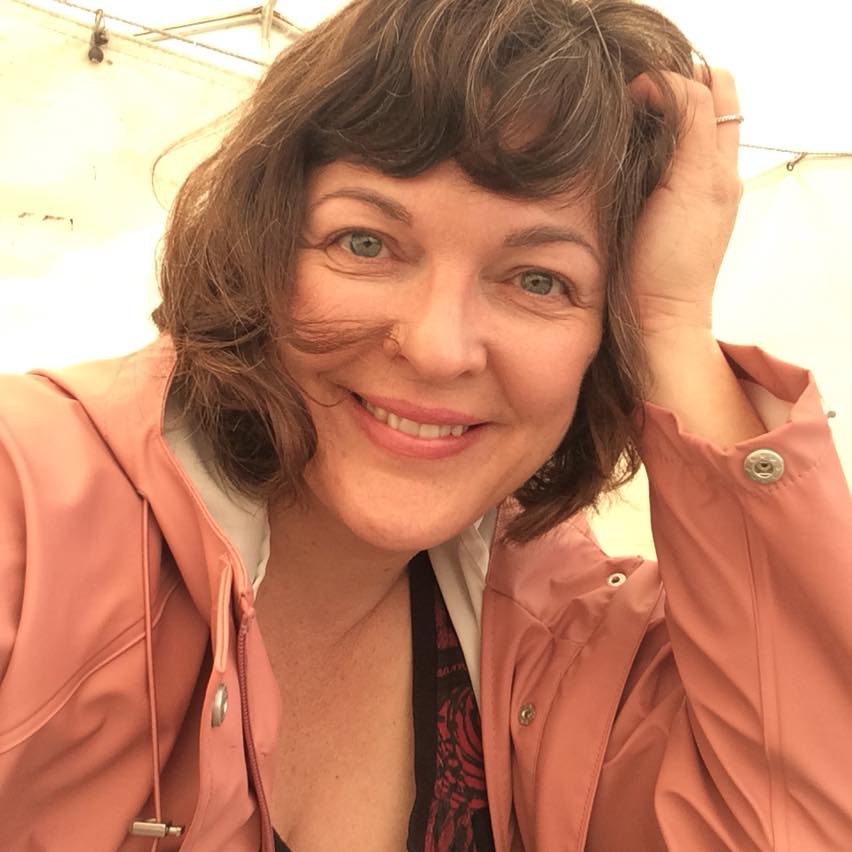I’ve waited to write this post for a time when I’m between shows as both a participant and as an audience member. Thirty years into the biz, I’ve seen many brilliant moving and life changing shows and I’ve even been in some. I’ve also been in and seen shows that have made me want to perform a root canal on myself with dirty pliers while listening to The Backstreet Boys rather than sit through act two. It’s the latter that can be tricky to negotiate when someone asks with flushed excited cheeks, “So, what did you think?!”
There is a way to be truthful without being a soul crushing dink.

“Buxom, blonde and well past her shelf date, Frangione’s fluttery and seemingly fragile Estelle…” Robert Sokol, Theatremania San Francisco
First of all, as unbelievable as it may seem, several times in the past thirty years I’ve seen my most hated play of the year win the Jessie award for outstanding new script or best production or at least get a nomination. I’ve seen the wankiest crap sell out like hot cakes. I’ve seen the most boring miscast interpretation of a role get critical acclaim. I know of colleagues who have submitted scripts that are relevant smart marketable funny and moving and the artistic director chooses some pablum nonsense or brings in a ho-hum show from Toronto or does yet another Mousetrap or mounts an incredibly expensive and wobbly new play that doesn’t speak to me at all. Why? God only knows. I’ve seen gorgeous productions close early due to lack of attendance and brilliant performers not work for years and years. Shows that have changed my life other people have said, “meh”. How is this possible?! I’ve written shows that people have told me to my face that they “f’ing HATED it!” and the same show another has said, “I absolutely LOVED it!” It never ceases to amaze me how subjective art is. I always keep this in mind when I see something I can’t stand and I always keep this in mind when I get a very negative response for my own work. I’ve learned that not every show is for everyone. How can it be? And thank goodness it isn’t. My opinion isn’t a universal truth.
Good art is very hard to make. This is what I’ve learned. The wonderful thing about theatre is: it’s collaborative. The frustrating thing about theatre is: it’s collaborative. How often have we seen incredible designs and rigorous performances applied to a script that is flimsy or perhaps a script that should have stayed a novel? How often have we seen a beautiful story undone by a lead actor who is way over the top or a romance performed by lovers who instinctively flinch when they touch? How often has a comedy been ruined because the director has no sense of musicality or physical intelligence and misunderstands farce as being louder faster with fart jokes? How often has a creative collective been crammed with great ideas and none of them gel and it’s a pile of devised doo-doo? And then there’s the sneaky undoers: lighting plots that obscure the faces and create that deadly distance with the audience because we just simply can’t freaking see. A sound design that underscores scenes in a way that suddenly make them maudlin. A set that is so difficult to negotiate the actors are physically in danger and the set changes slow down the momentum of the play to the point of utter tedium.
And you know what? I’ve been that playwright who ran out of time to finish the script before production, and I’ve been that actor who was directed to yell through the whole play. I am by no means immune to making terrible art. I have been that hideous stench of an effort. It is never due to lack of hard work or lack of care. It’s certainly never due to arrogance. I’ve only seen laziness and arrogance in a few young leading men who get work because they’re handsome. They don’t last long and frankly that laziness and arrogance is usually self sabotage because deep down they don’t believe in themselves and their Dad has told them to get a real job. In theatre there is too much competition for too little money for assholes, sloths or the incompetent to survive. What you’re looking at on stage and behind stage are people who are living on next to nothing to do this thing called art out of pure love and hope of making the world a better place.
Be gracious.

“As played by Frangione, Layla is…a romantic indulgent fantasy… who sports a somewhat wonky British accent that’s probably supposed to add to her glamour, but instead makes her sounds as prissy as Hermione in the Harry Potter movies…” Colin Thomas, Georgia Straight
So, when I see a show now and I’m alienated or bored or disgusted by it, I try to pin point what is not working (in my opinion) and isolate it in my mind. Then I try to see the rest of the play regardless of the crappiness that is going on so I don’t let the crappiness steal the show. if Marc Antony is repulsed by Cleopatra and clearly couldn’t swat a fly let alone lead the Roman army for three decades…then I stop looking at his face and body and I look at the supporting actors and the design and just listen to the words of the bard. It’s a good lesson for life: looking for the beauty in the muck and the light in the dark place, yes? There will always be something good going on. It would be highly unusual for all the collaborators to suck but highly possible for one of them to.
The trick is, what if Marc Antony is your friend? Worse, what if Marc Antony is the artistic director and you really want him to cast you in his next show? You don’t want to lie…but you don’t want to offend either. He knows you’re coming to the show and you’re meeting him backstage. Oh dear. What do you say?!
The worst thing you can do is say nothing.
Worse than being a failure is being a zero and when you say nothing you are making that person a cipher. They didn’t even happen. If we were all spiritually evolved people we wouldn’t care what others thought about us, but the fact is, most of us do. You may even think, “Well, this guy is one of the heavy hitters in town, he works all the time, he doesn’t need my praise”, you’re likely wrong. He may be worried that the next generation feels he’s irrelevant and old. He may be worried that he’s no longer got a six pack and can’t play leading men anymore and will soon enter that vortex of playing sweatered Dads and dukes. Even if he doesn’t care what you think about him, what you say about the show and his performance says something about you. If you say nothing, that says something about you. We tend to fill a void with the negative. I don’t know why, but it’s human nature. If you say nothing after his two and a half hour effort, the void could be filled with the assumption that you are unfeeling, rude, self absorbed, ungrateful, socially idiotic or jealous. He just gave you a gift. Believe me, he isn’t getting paid enough to be doing anything other than giving you a gift. You may feel this gift is akin to vomit in a mason jar tied with a yellow ribbon, but it is still a gift earnestly offered.
Say thank you.

“Frangione dances in a girdle which is brave considering her zaftig figure…” MMM, Malcolm Perry, Vancouver Sun
The second worst thing you can do is offer your negative opinion after a show.
People usually justify being critical and insulting by insisting that they don’t lie and they have high standards and they will always be “honest” out of respect. They will also insist that it’s only their “opinion” and the artist shouldn’t be so “thin-skinned”. They may also admit that they feel their searing insight may improve the show or at least make this actor a better actor by becoming more self aware having been exposed to their deep wisdom. This is the spin they try to put on their behaviour to justify being nasty controlling envious self righteous turds who were unlikely to have a good evening anyway because their life is miserable. Don’t listen to these people. don’t become these people. They are punishing you because you dare do what you do in the face of their own insignificance.
But what if Marc Antony asks for my honest opinion?
Still don’t give him negative feedback, he’s lying. He’s trying to be cool. Or, he’s trying to solve a problem that isn’t yours to solve. Most people can tell when they’re not hitting the mark. If you offer your critical feedback it may alter his performance and this actually violates the director’s vision. It isn’t right to try and redirect him, even if you’re dying to! You have to step very carefully here. There is the rare occasion when you can be helpful, but it has to be incredibly specific and you focus on your experience as the audience member and only if the actor asks you to. For instance, they may ask if their accent is okay. I think it’s fine to say, “To be honest, I had a hard time understanding you, especially when you became angry”, or “the A is actually Ah”. If the actor asks me if they yell too much, I may say “yes”. It’s a simple adjustment and the feedback is more about my experience as an audience, not the director’s vision.
But my issue isn’t with him, it’s with the director!
Still don’t give your negative feedback. Marc Antony doesn’t need to hear that the direction is bad because he has to still follow this direction night after night. You’re only going to make the show worse because now he has your ugly words in his head when he has to go out and do it all over again. Or, say you met Cleopatra after the show, don’t tell her she was brilliant but you couldn’t stand Antony. She can do absolutely nothing about Antony. She probably already knows that Antony is struggling and is miscast, you don’t need to burden her with that confirmation. Their job is to support each other and work together as a team. Don’t add to that divide with your two bits. It just doesn’t do any good. It’s selfish. Months and months after they’ve closed, then have that conversation, and only if she wants to. It’s not about protecting fragile egos, it’s about respect for the process.
I don’t want to encourage bad art! They’ll never improve if I coddle them!
Trust me, this artist is receiving audience feedback every night. Their response is telling them a great deal about their success right now. On top of that, reviewers and bloggers are all offering their opinions to millions of people, reviews that will be recorded and stored on the internet until the end of time. Nobody remains oblivious to their failures in this business. Don’t think of it as encouraging bad art, think of it as focusing on what is working.
But I have nothing positive to say!
Oh yes, I know, it’s a real skill. The art is to find the truthful gracious thing and it takes practice. If it’s a particularly bad show you have to start pondering at intermission what the hell you’re going to say. It doesn’t have to be much, in fact, less is usually more, but say something. This is not only good for your career and for your friendships, it’s a wonderful way to move in the world. There is always, always something good to say. So Antony was miscast, did he do anything right? Well yes, his phrasing was excellent. That’s all you need to say. “Your phrasing is so good!”
But say Antony also had terrible phrasing and sucked at his swordplay and all round you just can’t think of anything to applaud? What if you are still so angry with frustration because you had to to sit through three hours of mangled text? You don’t want to say something obviously avoiding his performance altogether like, “nice costumes” or “I really liked Cleopatra…”
Well…I take several deep breaths. I think of the task he had before him and I get him talking about his process. It’s a great strategy to acknowledge the mammoth task he took on (even if he failed in your opinion) and to ask him about his approach. “Marc Antony! What a role! Have you always wanted to play him?” or ” “I think it would be fascinating to play a historic character like that. What did you do for research?” or “This production really made me question what I think I know about Marc Antony” These are all true things, I am not lying. It also diverts the conversation away from value judgments and towards a more interesting conversation about the play. Most people will absolutely want to talk about the play, at great length. At the very least I say something like, “Are you enjoying yourself? Wow, what an opportunity! Well done for landing this gig! What a wonderful long run you have, is this your first time working for this company? Are they treating you well? I love Shakespeare!” Like I say, usually artists know when something isn’t completely working, so give them an opportunity to talk about what they have enjoyed and what is working.
What if I don’t like staying after a show to talk to the artists?
That is completely fine. I rarely stay after a show to talk to anyone because I love to just hold the experience for a while longer. I don’t feel like socializing. But if they know I’ve come, I will write a little email to them to thank them and I offer up something I enjoyed.
Once in a while I am very upset by a show and find it appalling. It’s usually because I find it sexist, racist, religious discrimination, unreasonably nihilistic or slanderous. In this case, I walk out if it’s clear that there will be no justification or awareness. If I sit through the whole thing and am very upset by it I feel I have every right to be honest about my feelings. I’ll say, “This play upset me.” “This play made me very angry as a woman”. Or, “I’ll have to think about this for a while.” or “I’m not sure what I feel, I’m overcome.” I just leave it at that. I do not go on. Sharing these feelings isn’t an insult, it’s the truth of my reaction and many artists would see this as a compliment. More times than not, a play that upsets me does so in order to get me to think. Often it is intentional. Sometimes I hate a show and then a week later I love it for having taught me something, I admire it for making me so deeply uncomfortable that I had to confront something in my life or in my society.
What if I love a play?!
Wonderful! Success! Giving compliments is an art too! If you really want to encourage someone, be specific. If you say “you’re great, that was wonderful” that’s all fine and lovely but it won’t land in any significant way and most artists won’t believe you because you’ve been too vague. Again, we don’t want to focus on things other than the performance, “amazing costumes” or “how did you memorize all those lines?!” The best compliment is to tell the artist how the art made you feel and what questions it provoked in you. “I loved your Cleopatra, she was so full of contradictions and yet I understood her. Oh the moon speech – I couldn’t breath – interesting how relevant this relationship still is – the power couple, right? When she sacrifices her career for love and when she sacrifices her love for career.” And it’s also just fine to say things that are less profound, “And the costume designer put you in a WHITE BATHING SUIT and baby you ROCKED IT”. Avoid the back handed compliments, “You did a great job despite the fact you’re working opposite a toad” or “Ooh, finally a role you suit, you do well when you play high status” or “you keep improving every show I see you in!” or “I didn’t think you could pull this one off but you did!” Please, please don’t do that. I’ve heard all of these things.
I’ve been focusing on the actors here but let me say a few words about watching a play and then giving feedback to the playwright. Is this the first production? It most likely is. It is very very important to not compare this first production with plays that have had several productions. A world premier is not a finished play, it is a play still in development. Why? Because there is only so much you can know about a play before it is in front of an audience in a fully produced version of itself. Do I need this monologue about the stained glass window or is it more moving to have the actress stand in a gobo of stained glass in silence? I can’t fully see it until I have a stage with lights and an actor. Is this line funny to most people? I need a crowd. Does this character have a clear emotional arc despite the fact they are largely non-verbal? I don’t know until the actor has worked on it for a couple of weeks and shares his process of discovery. Is it difficult and confusing to put a camel ride on stage or is it a fun challenge for the designer and director? A few creative teams will have to try. Is the central question clear? I have to let the director tackle it for a few weeks. Is this play relevant to people today? I’ll hear how many times an audience coughs and see how often they wiggle, I’ll watch for what demographic shows up and if tickets sell.
So, if you are watching a world premier, keep this in mind: it is still evolving, changes will be made.It would be incredibly rare to hit it out of the park first try. I’ve had two very successful first productions out of thirty plays: Cariboo Magi and Espresso. I made very few adjustments after the first runs. I got lucky. All the other plays I massively rewrote and many of the massively rewritten ones have gone on to be my best sellers: Chickens, Christmas on the Air, Leave of Absence.
In my experience, playwrights are neurotic nerdy shy oddballs who spend way too much time alone and can be obsessive, deeply passionate and utterly lacking in fashion sense because they do not care. They have smudged glasses, a well worn mug, a penchant for walking in the rain and they have worn the numbers off their computer keys. They could write for film and they know it but they choose not to give away their creative control. 90% of their work is done in utter solitude, 10% is done in a room full of extroverts who are all trying to “fix” and “rewrite” and “adjust” and “add a funny line” to a script they’ve just read, a script that the playwright has spend years, literally years, working on. For the hours they spend, they get paid the least out of all the theatre artists unless they pull a Mary’s Wedding and end up going across the country with a hit show. That is extremely rare and even then, it’s hard to repeat. Commissions are rare and so are successful grant applications. I’ve only ever received one Canada council grant in my career and two BCAC grants in my career in thirty years, and I’m a successful writer! The playwright usually writes 4-15 drafts before a first production and has put in 300-1000 hours and has likely had several readings with actors and directors, several dramaturgical meetings and perhaps even a public reading. They have received a shit ton of advice and criticism. Then the show gets mounted and the playwright watches the audiences for reactions and tries to avoid reading the papers where the critics invariably tear them apart for not having a perfect product yet.
To be honest, I can’t even think of a first production of a play I’ve seen where I thought it was brilliant right off the hop on all fronts except perhaps The Playhouse version of The Overcoat, Morris Panych’s Vigil and Joan McLeod’s Another Home Invasion. Those spring to mind in my thirty years. Don’t get me wrong, I have seen things I’ve loved here and we have some brilliant writers! But the first productions wobbled, as they should be expected to. Celebrate instead Aaron Bushkowsky’s gorgeous use of language, Kendra Fanconi’s ground-breaking practice, Amiel Gladstone and Veda Hille’s compatibility and dry wit, Kevin Loring’s compassion and accessibility, Carmen Aguirre’s outrageous sexuality., Kevin Kerr and Jon Young’s intelligence, and know that all these writers learn from their first productions, they rewrite, and then they produce again elsewhere.
If you see a writer after their show, especially after opening night, don’t say nothing and please don’t offer a negative opinion without being asked. It’s not about fragile egos, it’s about being useful to the process. Likely what they need to know is what is working. Be specific with what you liked. “I loved hearing actors speak in animal languages, that was so cool!” Be specific with what the play made you ask yourself or think about, “I’ve heard of satellite kids but I’ve never considered how lonely that life would be”. Let them know how it made you feel. “I was uncomfortable with the selfishness of the lead but I have to admit, it hits home.” And if you are dying to express something that is critical and if the playwright has invited you to give your honest feedback, put it into the form of a question. “Why would she fall in love with him? I had a hard time understanding that.” Perhaps you felt the play tied up too neatly into a red bow at the end, don’t assume you’re right, even though you’re like 99.9% sure you’re right. Instead, ask a question, “Why did you let her off the hook at the end of the play? Why didn’t you let her face the consequences?” Questions are useful, judgments are not.
Finally, a few words about receiving criticism.
You are allowed to tell anyone and everyone, “I don’t want to hear anything negative about me or my team.” It’s your work, you can set your own boundaries. It’s not about being “fragile”, it’s about your commitment to the vision. You can decide to not read any reviews or blogs about your work. They aren’t designed for you. They are designed to attract and inform the audience.
If someone says nothing after a show. Try not to fill the void with negativity. Likely this person is just self absorbed, oblivious or inarticulate.
If someone starts criticizing, cut them off. Shut them down with a quick change of subject or simply say, “no feedback please, I find it distracting, thanks”. Most effective is, I cut them off and start asking them questions about them. They’re usually sounding off with their opinion because they are feeling the need to be heard, so I give them some attention that isn’t at the expense of me or my colleagues. “Great jacket!” etc.
If criticism sneaks through anyway and sticks in my mind and I’m an actor, I will talk it through with my stage manager. “I’ve been getting some criticism that I’m not as scary as the movie”. The stage manager, if they are good, will remind me of the director’s vision and often set me back on track. “Remember, this isn’t the movie, it’s a theatre experience. We’ve created something completely different. Staging the movie would have been boring. Don’t listen to that moron. People are loving the show.” If I’m a playwright, I’ll funnel criticism through my dramaturg who knows the play nearly as well as I do. “I got a letter back from this AD that says I have no structure for Act Two.” And the dramaturg, if they are good, might say, “Yes you do have a structure and it builds to a strong climax. However, scene three might be extraneous.”
You don’t have to invite everyone to everything. Some people’s opinions will matter too much. For instance, there are some shows I just know my Mom will hate, even shows I’ve written. I know she loves me and believes in me but I don’t ask her to see everything. I know it will bother me if she doesn’t like it, even though I’m a “big girl”, it’s still my Mom, right? So, I invite her to things I think she will enjoy. I talk about all my projects with her but I don’t make her sit through them all, that’s not her obligation.
Lastly, if you are an artist, find your true fans. Find at least one person who believes in you and your abilities through your successes and failures and doesn’t feel the need to burden you with their negative feedback. Find someone who knows how to see the beauty in the muck and the light in the darkness. Invite them to opening night. For me that is my husband and my friend Anita. I have many others who are very supportive but sometimes they just can’t help their disappointment. Scott and Anita always see the bigger picture of what I’m trying to accomplish. Scott came to Holy Mo A Christmas Show three times, not because he had to, but because he wanted to. Anita has believed in me for nearly thirty years. She saw the actress and writer I am today back when I was only nineteen years old. She was the person who told me it was all possible. Turns out, she was right.








So much truth here, Cia. Thank you! Much of what you say is also really useful for helping a dramaturg respond to a play in process (and aren’t they all?). I have often wondered what to say after seeing some friend’s disaster — and I find that a simple “Thank you” can be all that’s needed.
I understand why many playwrights loathe talkbacks after readings or performances. I happen to like them, which is a bit weird, but I’m OK with that. I also think that body language is a truer tell than conventional verbal responses, so I watch for those. With actors, I often ask, “What was your greatest challenge with this part (or show)?” And that can be the beginning of an interesting and useful conversation.
Sometimes, “I loved every minute!” is the truth. It does happen. And it will again.
so true, David, so true! When theatre works, it’s incredible! xo
So so good! XO
thanks #1 fan, I love you!!! That’s two posts in a row you’re featured – you are inspiring!
Lucia – you are spot on. You handle this crucial part of the artistic life so profoundly and graciously. It’s so rare that lightning strikes in every facet of a production – there’s always something to enjoy in a doozy, even if it’s the dimming of the lights with strangers all around you, the picking of a hangnail just so while bored in act 2, seeing your friend/colleague/ex-partner/chum-you-went-to-school-with putting their guts out there, knowing that your presence in that seat counts, confirming that artists are still striving. xo
Xo true! I don’t always remember to be my better self as an audience member … but I try!
Hi Lucia, great post! More artists, audiences and critics could use this advice. I always like critics that can pick out specific good qualities along with the bad, as rare as that is.
Would you mind if I link to this article for my Communication in the Arts course?
Dan
Hello my dear cousin – I would be honoured!